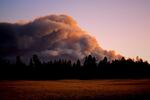
The Lionshead Fire started small and later erupted during the Labor Day weekend windstorm in Oregon last summer.
Nathan Parsons / Warm Springs Agency
Oregon’s Office of Emergency Management is calling on the state’s residents to think critically about how they’re preparing for the next big crisis event.
Over the past year, Oregon has taken a beating from severe wildfires and drought, destructive ice storms, tragic heat events and a pandemic that continues to fill hospitals and morgues statewide.
With those events in mind, the state is asking Oregonians to “honor with action,” meaning that the Office of Emergency Management (OEM) wants you to pay respect to those who have lost their life, home or livelihood to a disaster event by taking your own individual preparedness more seriously.
According to OEM Director Andrew Phelps, those actions can look very simple, but go a long way in terms of protecting yourself, your family and your community in the event of an emergency.
That includes doing things like identifying evacuation routes in your home, work or school; establishing an emergency plan and practicing it; packing a go-kit with essential items such as copies of important documents, medications and phone chargers; and signing up for emergency notifications.
“If you and I are prepared for an emergency, we know how to get out of our homes or evacuate our communities, we’ve signed up for alerts and we’ve got our kits or shelter-in-place kits ready, that’s two more families that don’t necessarily need assistance from the fire department or police department,” Phelps said. “Those resources can then go to families that are under-resourced or folks that have disabilities and can’t access transportation to evacuate.”
OEM also suggests other actions to take that include establishing or joining a Community Emergency Response Team (CERT) or a Neighborhood Emergency Team (NET); creating relationships with neighbors to ensure everyone is checked in on when an emergency takes place; and donating to or volunteering with disaster relief organizations such as the American Red Cross.
Since the 9/11 attacks in 2001, governors across the nation have proclaimed September as National Preparedness Month to remind Americans that, while the nation’s first responders are highly trained and skilled at what they do, there will be occasions in which they’re stretched to the limit. In those events, the onus will be on each and every community member to do their part to take care of themselves and each other.
Phelps was living in New York City during 9/11, and he remembers how, even in a city with emergency infrastructure as well-resourced as NYC, there was still devastation that followed as every single first-responder in the city rushed toward the World Trade Center, leaving massive gaps in service elsewhere.
Fast forward 20 years and nearly 3,000 miles away from New York, a different type of crisis had Oregon’s first responders stretched to their limits as they rushed to save lives and property amid historic wildfires. Meanwhile, smoke wreaked havoc on vulnerable populations and caused people to be hospitalized..
Just a few months later, an ice storm left hundreds of thousands across the state without power. And a few months beyond that, extreme heat killed upward of 120 people.
At the same time, a Cascadia Subduction Zone earthquake hundreds of years overdue looms under our feet every single day.
Phelps believes that while Oregonians are aware of the dangers they face year in and year out, they’re woefully unprepared. That’s the major message behind National Preparedness Month.
“I don’t think everybody understands that emergencies and disasters can impact them,” Phelps said. “We have hazards of fires, hazards of flooding and earthquakes and winter storms and utility outages, but the one hazard that we really struggle with is this hazard of apathy, where folks think, ‘It can’t happen to me,’ or ‘I can prepare later before the disaster happens.’
Phelps said OEM is struggling to help Oregonians see just how vulnerable they are. That’s the main message behind the agency’s push to get people thinking about preparedness during the month of September as the nation remembers 9/11, and as Oregon remembers the destruction that took place just a year ago.
“All of those things make such a huge difference between being a disaster victim or disaster survivor,” he said.


